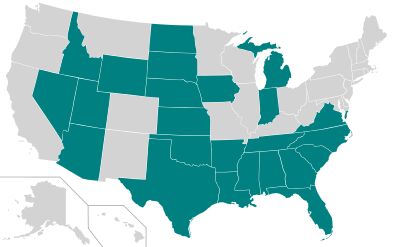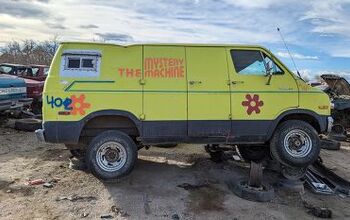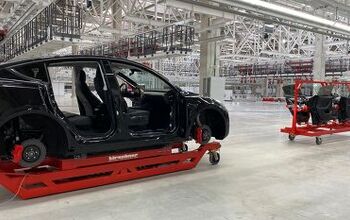UAW Faces Right-To-Work Laws in Kentucky Counties

States with right-to-work laws are in green. Wikipedia graphic.
Organized labor has had setbacks as states formerly seen as union strongholds in the industrial midwest, Wisconsin and Michigan, have enacted right-to-work legislation that makes paying union dues voluntary. Now, the United Auto Workers, which has been trying to organize autoworkers at ‘transplant’ facilities operated in the American south by foreign automakers faces the prospect of dealing with right-to-work laws at the county level, in Kentucky. The new laws present the autoworkers’ union with a double whammy.
Three counties in Kentucky, Fulton, Simpson, and Warren counties, have already passed laws and Hardin, Todd, and Cumberland counties are expected to do so in the near future. While no such law currently exists in Scott county, where the UAW would love to organize Toyota’s large Georgetown assembly facility, many Kentucky counties are expected to follow suit, hampering the UAW’s organizing efforts in the state. Furthermore, Warren county is the home of General Motors’ Corvette assembly plant. That means that as the union faces a greater challenge to organize at foreign owned auto plants, it could conceivably be decertified at a facility operated by one of the Big 3 Detroit automakers, something unheard of.
Chad Poynor, a UAW committeeman at the Corvette recently told the New York Times, “You hear people all the time say, ‘If I were in a right-to-work state, I’d withdraw’.”
While the labor movement plans lawsuits, claiming that county laws cannot trump federal labor law, right-to-work activists point out that while the U.S. Supreme Court has not yet ruled on local right-to-work laws, the National Labor Relations Act specifically permits the individual states to enact such legislation. Furthermore, the congressional record shows that Congress, in the NLRA, expressly disavowed that federal law superseded state right-to-work laws and that view has been uphold by the Supreme Court when unions have challenged state RTW statutes.
As federal labor law currently stands, a union that has been certified at a company can require non-member employees to pay the costs of representing them, unless such requirements are “prohibited by state or territorial law” as stated in the NLRA.
Kentucky law expressly gives counties regulatory authority over commerce and economic development, so in the eyes of the federal government, at least as RTW activists see it, county laws should be seen as the equivalent to state laws. For its part, the AFL-CIO says, “Nice try — state means state.”

Ronnie Schreiber edits Cars In Depth, the original 3D car site.
More by Ronnie Schreiber
Latest Car Reviews
Read moreLatest Product Reviews
Read moreRecent Comments
- Lou_BC Let me see. Humans are fallible. They can be very greedy. Politicians sell to the highest bidder. What could go wrong?
- SPPPP Vibrant color 9 times out of 10 for me. There may be a few shapes that look just right in metallic gray, for example. There are a few nices ones out there. And I like VW "White Silver". But I'd usually prefer a deep red or a vibrant metallic green. Or a bright blue.
- 28-Cars-Later Say it ain't so, so reboot #6* isn't going to change anything?[list=1][*]V4-6-8 and High "Tech" 4100.[/*][*]Front wheel drive sooooo modern.[/*][*]NOrthSTARt.[/*][*]Catera wooooo.[/*][*]ATS all the things.[/*][*]We're *are* your daddy's Tesla. [/*][/list=1]
- MaintenanceCosts Can I have the hybrid powertrains and packaging of the RAV4 Hybrid or Prime with the interior materials, design, and build quality of the Mazda?
- ToolGuy I have 2 podcasts to listen to before commenting, stop rushing my homework.


































Comments
Join the conversation
I thought "right to work" meant "right to be fired from your job for no reason and be stuck trying to get another job while having no money".
I do think this is a great move by the counties. People who want to be a part of a political movement can do so if they wish. I do think in over the next couple of decades unions will become the flavour of the month again. This time it will not be so much the "blue collar" workers. If I were a betting man I would say anyone involved in a job that has recurring processes will become robotic or AI. How many professional middle class jobs sit in this bracket? I've read 65%. As I've mention on this site previously, the late 19th century with the advent of the electric motor removed many (then) middle class jobs. Process workers multiplied rapidly to create consumer goods. Socialists and their union brethren multiplied like locust to infect to world with their communal ideals in the search for Utopia. It's about the occur again, it's already started. We will be the better for it in the longer run after some more re-adjustment of our economies and politics. What I find really odd about this is the fact that most middle class jobs historically can and will be replaced by machines/AI/robotics. The jobs that are the hardest to replace are the "menial" low paying jobs that are difficult to be done by a machine or computer. So, are the textile workers, burger flippers and farmhands grossly under paid. Are we so called "smart" people not as clever as we thought?